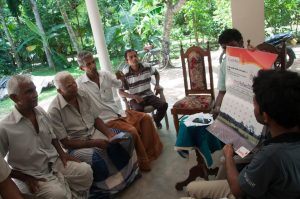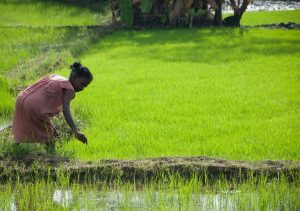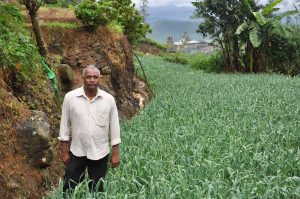The GSMA mAgri program is currently supporting six Mobile Network Operators (MNOs), two in Sub-Saharan Africa and four in South Asia, in launching and scaling agricultural Value-added Services (Agri VAS). One of the key learnings across all countries has been the importance of spending time with farmers and other agricultural ecosystem players at different stages of the service’s evolution to understand their needs, placing Human Centred Design (HCD) at the core of the offering.
In order to support HCD as a key pillar of the six projects, each MNO committed to engaging a dedicated user experience lead for the Agri VAS project. Simultaneously, GSMA partnered with Frog Design, a global design consultancy, to support and build capacity for design research within each MNO – the key principles for which are highlighted in the GSMA mAgri Design Toolkit.
This blog focuses on how Dialog Sri Lanka utilized HCD in developing its Agri VAS service. Govi Mithuru/Uzavar Tholan (Farmer’s Friend in Sinhala and Tamil languages respectively), provides advice on farming best practices across a variety of crops through both automated outbound dialling (OBD) and interactive voice response (IVR). Insights to support iterative design of the product were gleaned from common patterns emerging through interactions with more than 50 farmers, alongside data-driven business intelligence and phone survey feedback. This blog takes the form of three stories, each highlighting a core farmer interaction, what was learnt and how those learnings were incorporated into service design throughout the product development cycle.
Focus Group Discussion (four experienced paddy farmers)
Farming realities vary greatly by region and tailoring content to these varying needs is critical
 September 2015: Dialog’s product team were in Sandalankawa, Kurunagela District, testing content the accuracy, relevance and timeliness of the advisory messages to be made available for paddy farmers on the service. For this purpose, the team set up a focus group discussion with four smallholder paddy farmers in Sadalankawa, where they would listen to the messages and give their feedback.
September 2015: Dialog’s product team were in Sandalankawa, Kurunagela District, testing content the accuracy, relevance and timeliness of the advisory messages to be made available for paddy farmers on the service. For this purpose, the team set up a focus group discussion with four smallholder paddy farmers in Sadalankawa, where they would listen to the messages and give their feedback.
The same content had received very positive feedback in interviews held in other parts of the country. However, farmers in this focus group believed that the practices being highlighted were relevant only for farmers in irrigated areas of the island. Sandalankawa, though, sits in the intermediate zone which is largely rain fed. As a result, the context, and thus the information need, of these farmers was materially different from the timing and advice for paddy farmers in irrigated areas.
Recognising this gap, the Dialog team requested an update of paddy content to take into account the major agro-climatic variances relevant to paddy farming in Sri Lanka. Similar variances highlighted in other interviews led to the development of an exceptionally customized service that profiled users based on:
- Duration of crop (Paddy variety) – 3 months, 3.5 months and 4 months varieties (time from sowing to harvest)
- Agro ecological zone – Dry, Wet, intermediate
- Irrigation – Rain fed, Major irrigation, Minor irrigation
Content received by users, was therefore tailored to users’ specific profiles by developing 27 unique content trees, each providing advisory relevant to a particular profile based on the segmentation described above. This ensured that the advice received from Govi Mithuru/Uzavar Tholan carried grassroots relevance, abandoning a one-size-fits-all approach to provide information tailored to the varying needs of farmers across the island.
Wijayapala Sumanavathi
Improving service experience by minimizing the need for ongoing user inputs
 Born and raised in Polonaruwa, 64 year old Ms. Sumanavathi has been farming paddy for over 25 years, primarily on 10 acres of land that she and her family of 7 own. Ms Sumanavathi signed up for the service via a field agent who visited her home during a door-to-door campaign during November 2015. Approximately 2 months after the service was launched commercially, Ms Sumanavathi was interviewed by the product team to better understand the impact of one of the service’s key features – missed call alerts.
Born and raised in Polonaruwa, 64 year old Ms. Sumanavathi has been farming paddy for over 25 years, primarily on 10 acres of land that she and her family of 7 own. Ms Sumanavathi signed up for the service via a field agent who visited her home during a door-to-door campaign during November 2015. Approximately 2 months after the service was launched commercially, Ms Sumanavathi was interviewed by the product team to better understand the impact of one of the service’s key features – missed call alerts.
During initial user testing, farmers had clearly indicated their desire for timely crop information. Building further on the insight that users required information tailored to their specific contexts, the team sought to capture the effect of timing of the advisory information as well. A ‘missed call’ feature was introduced, whereby farmers would give a missed call to 6166 when they started preparing their land. A subsequent missed call to 6167 would denote that they had now moved to the next stage in the farming cycle, seeding, and so on. In order to remind users to call in and customise the service for their precise activities, a physical calendar was created which would complement the service and provide reminders of all the ‘missed call’ numbers.
However, despite having been signed up by an agent who spent more than 30 minutes with her, Ms. Dayavathi was very confused about what the missed calls denoted. The multiple numbers were also hard to remember, and the messages on the calendar were not fully understood. Further, she believed that the information was both customised and timely even without this feature – she had received and actioned content regarding how to avoid rat attacks on paddy farms which had had proven to be successful and she was very satisfied with the outcomes.
Based on this and other interviews which highlighted a similar pattern, the missed call feature and the accompanying calendar were removed, thereby enhancing ease of use of the service. Timeliness of the advisory was still maintained by following a pre-set crop calendar for each of the 27 content trees based on expert input.
Sivalingam Krishnakumar
Upfront guidance on navigating an IVR menu makes the process easily understandable
 Sivalingam Krishnakumar is a smallholder farmer growing carrot, beetroot and leek on 1 acre of land in Nanu Oya, Central Province. He also owns a cow for domestic milk production and is the sole breadwinner in a family of six.
Sivalingam Krishnakumar is a smallholder farmer growing carrot, beetroot and leek on 1 acre of land in Nanu Oya, Central Province. He also owns a cow for domestic milk production and is the sole breadwinner in a family of six.
The product team were conducting research to better understand the user experience during the subscription process. Mr Krishnakumar was not subscribed to the service at the time the Dialog team interacted with him. However having been informed about the service benefits and, given his interest, he went through the registration process with the team.
Upon dialling 616, he was directed to the registration menu. The first audible instruction was a prompt to press ‘0’ to subscribe for a non-crop specific category. He immediately tried to press ‘0’ but as he was looking for the button to press, the recorded voice continued and he realized that further options were available. He then went on to select carrot, which was the crop he was planting at the time.
Based on this and other such experiences, the Dialog team introduced a prompt at the outset of the registration menu informing potential subscribers that there are multiple menu options, each of which represented a different crop that they were encouraged to listen to before making their selection. This was to ensure that upfront profiling was accurate and farmers selected content that was most useful to them – thereby enhancing their engagement with the service.
Conclusion
Adopting a human centred approach has reaped considerable benefits for Dialog in developing a service that meets farmer’s needs. Over the past 18 months, the service has attracted over 286,000 users, of whom 267,000 have engaged with the content. As of October 2016, 85 per cent of the subscribers are repeat users of the service. Govi Mithuru is now the fifth most subscribed VAS service in Dialog’s portfolio despite its relatively short history and is growing rapidly, adding over 50,000 users in January 2017.
A ‘Rapid Feedback’ phone survey conducted by GSMA in partnership with ALine in August 2016 showed that 83 per cent of users found the content to be “very informative” or “quite informative” while 75 per cent reported having recommended the service to a friend.
Placing Human Centred Design at the heart of service development has reaped immense benefits for Dialog and our other MNO partners. If you are interested in further discussing HCD for Agri VAS services, write to us. We are always eager to hear from innovators!
Please note that to maintain privacy, the names of the interviewees used in this blog are aliases.

